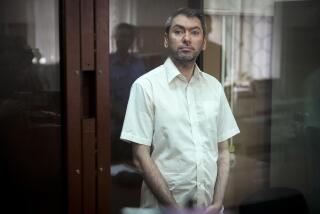Insisting on Truth
- Share via
“Speaking the truth,” says Andrei D. Sakharov, “is an absolute necessity.” For some in public life those words are no more than a conventional piety. But for the famed Soviet physicist and political dissident, they embody a central and compelling value.
Sakharov has suffered a loss of livelihood and freedom because he chose to act on the necessity for speaking the truth about the condition of human rights in the Soviet Union. Most recently he endured nearly seven years of internal exile for criticizing the Soviet invasion of Afghanistan. Last December Soviet leader Mikhail S. Gorbachev ended Sakharov’s banishment and allowed him to return to Moscow. Since then Sakharov has endorsed Gorbachev’s reformist efforts. Now the Nobel Peace Prize laureate has also made clear that he will continue to press for honesty in confronting the Soviet past.
That intention was made known in an interview published this week in the limited circulation Moscow News, and in subsequent comments to American news media. In the interview, given before Gorbachev’s long speech last Monday reviewing events since the Bolshevik Revolution, Sakharov notes that “the entire horrible history of Stalin and his era has not yet been told.” There were some who hoped that Gorbachev would finally produce an official public reassessment of those terrible years. He did not. Instead, guided by apparent continuing internal conflicts over how far official candor can be allowed to proceed, Gorbachev stepped gingerly around the issue of the crimes of the Stalin era. He did say that a Communist Party commission to investigate that period has been set up, which Sakharov finds encouraging. But some skepticism is in order about just how comprehensive and honest that review will be permitted to be.
Sakharov, in an interview after his Moscow News comments appeared, insists that the “whole truth” must be told about the reign of terror that occurred during the quarter of a century when Stalin reigned supreme. The whole truth would have to include revealing the full details about the forced collectivization of agriculture that led to the deaths of millions. It would require candidly acknowledging the extent of the purges that saw millions more perish in the inhuman conditions of distant labor camps or, more swiftly but not less brutally, in the cellars of the secret police.
Is the Soviet system capable of exposing the totality of these truths? Only if it is prepared to raise fundamental and deeply uncomfortable questions about the nature of authority in the Soviet Union, and about the role of the party in whose name Stalin ruled. Do Gorbachev and his colleagues feel secure enough to risk confronting these questions?
The one seeming certainty at this point is that Andrei Sakharov will continue insisting that they do so, will go on asserting the necessity for truth. Punishment and internal exile have not blunted his courage. The gadfly hasn’t lost his bite.
More to Read
Sign up for Essential California
The most important California stories and recommendations in your inbox every morning.
You may occasionally receive promotional content from the Los Angeles Times.













